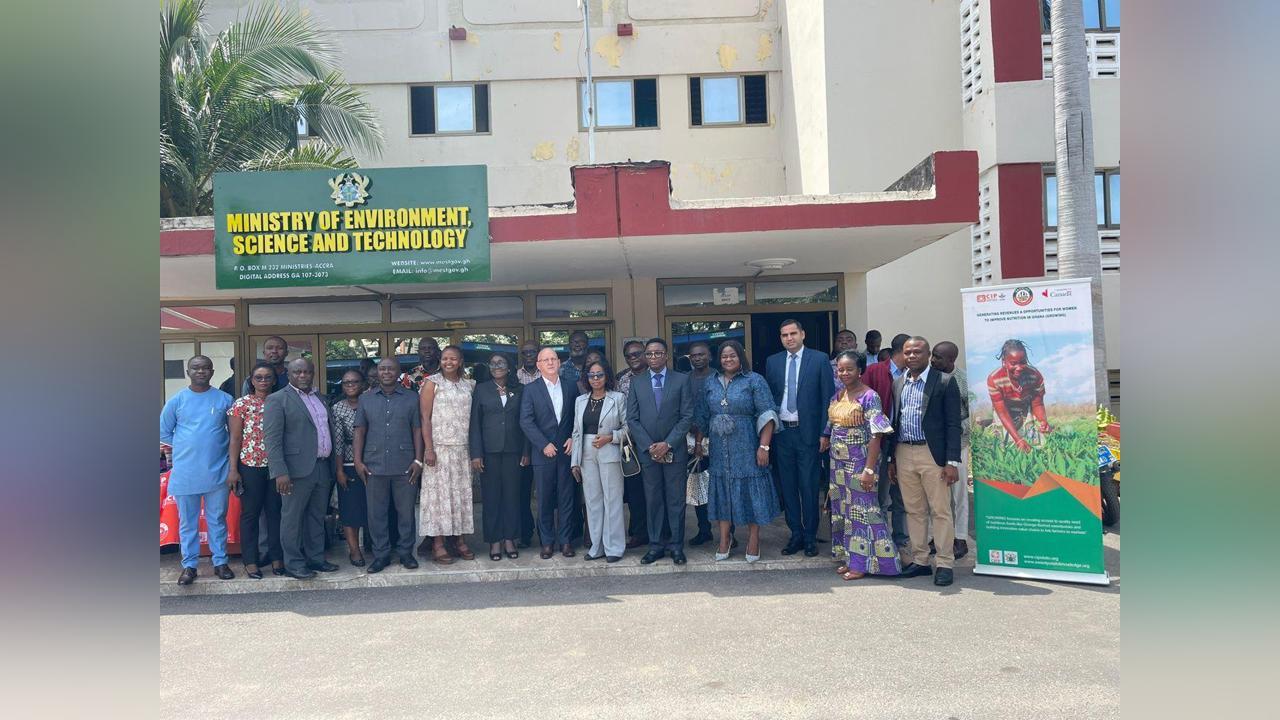Africa-Press – Ghana. Dr. Ibrahim Murtala Muhammed, Minister for Environment, Science and Technology (MEST), says Roots, Tubers and Bananas (RTBs) remain resilient, climate-smart, and locally accepted staple crops.
He said RTBs could thrive in diverse and often challenging environments, and were much more than just sources of food, but lifelines for many smallholder farmers and the backbone of food security for millions across Sub-Saharan Africa.
The Minister said this in a speech read on his behalf by Madam Suweibatu Adams, the Chief Director of the Ministry, at a stakeholder roundtable discussion in Accra.
The event was on the theme, “Leveraging Science, Technology and Innovation to enhance food security, promote import substitution and drive export promotion.”
It aimed to provide a platform for engagement among key stakeholders from government, research institutions, development partners and private sector to deliberate on practical strategies to enhance Ghana’s food systems and promote agricultural transformation.
Dr. Muhammed said the discussions presented a new opportunity termed, “Second Green Revolution for Enhanced RTBs Productivity through Modernised Integrated Breeding led by Ghana for Sub-Saharan Africa.”
He said if cereals failed in a season, a root or tuber would still lie in the soil, and even in the dry spell, a plantain or banana might still bear fruit.
Dr. Muhammed said their focus on RTB crops such as cassava, sweet potatoes, yams, potatoes, cocoyam, taro, plantain, and bananas was deliberate and strategic.
“In West and Central Africa, RTBs are not only staple foods but also sources of vital micronutrients and economic empowerment especially for rural women,” he added.
He said Ghana was the second-largest producer of cassava in West Africa and a major exporter of premium yam tubers.
The Minister said RTBs contributed up to 30 per cent of Ghana’s agricultural Gross Domestic Product, reinforcing their strategic role in livelihoods and national food systems.
He said however, despite their importance, RTBs faced persistent challenges including low-yielding varieties, pests and diseases, poor soils, and weak market linkages.
“If we are to move from subsistence to surplus, from vulnerability to resilience, we must rethink how we breed, manage, and scale up these crops,” he stressed.
The Minister said the revolution would need modern breeding programs using genomic tools and data, strong policy and institutional backing, private sector involvement for commercialisation, and leadership from African nations with Ghana taking the lead.
“The cost of cereal imports in West Africa alone is nearing $10 billion annually, draining our economies and exposing us to global shocks,” he added.
Dr. Simon Heck, Director General, International Potato Center, said when discussing root and tuber crops, it was important to note that, compared to grains and cereals, they were significantly more efficient in their use of resources, particularly water and soil nutrients.
He said farmers were increasingly adopting RTB crops, as their experience showed they performed more reliably under local and variable conditions, unlike crops such as maize, which were more dependent on specific rainfall patterns.
Dr. Heck said while the reliability of yields was a clear advantage of root and tuber crops, farmers also prioritised food quality and income potential.
“Our collaboration with the food industry aims to promote the use of these crops as viable ingredients for products such as bread and breakfast cereals, highlighting their value beyond primary production”
“We have varieties that are particularly suited for that, for the use in food processing, let’s say, rather than for home consumption and we can prioritize these varieties if you come on board as a partner,” he added.
KOA
For More News And Analysis About Ghana Follow Africa-Press







